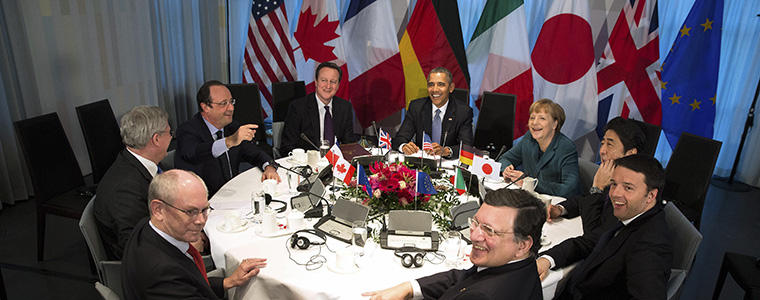The United States and its allies have imposed stinging sanctions on Russia. To make them work, they need to hold fast.
The sanctions that were placed on Bank Rossiya on Friday, March 21, have sent shock waves through Russian business and financial circles. In the intervening days, hundreds of thousands of Russians have lost access to Visa and MasterCard services. Russian oligarchs have stopped boasting that they are on the U.S. blacklist as international bankers and have begun to shy away from their businesses -- and their access to credit dried up while their stock prices tumbled. Russian owners of mining, metals, energy, financial services, engineering, and defense firms are now terrified that sanctions on their sectors are next.

Now that the financial sanctions that the United States and its allies in the European Union imposed on Russia after its illegal annexation of Crimea are beginning to work, the challenge is to not relax, but rather to increase the pressure until Ukrainian sovereignty is solidified. In 2008, following the Russian-Georgian war, the West took similar steps to punish Russia for violating the territorial integrity of a sovereign neighbor, but subsequently relaxed them, implicitly accepting Putin's fait accompli and setting a precedent for another attack, this time on Ukraine. The West must now prove it has learned from that mistake. The regime of international sanctions that the United States and Europe imposed has real bite, and they must stay in place, and increase, until clear objectives are met, ensuring the new Ukrainian government in Kiev is on solid political and financial ground.
So far the Americans and Europeans have stayed firm. They've put in place two rounds of restrictions on the assets and visas of Russian officials responsible for the decisions to invade Crimea, conduct a sham referendum, and illegally incorporate Crimea into the Russian Federation; the United States has included sanctions on oligarchs close to the Kremlin. More rounds should follow. This kind of ratcheting up of the sanctions will convince the Russians that the United States and Europe are serious and steadfast.
The West now should agree on the outcomes it needs to see in order to stop adding to the sanctions on individuals, banks, and sectors of the Russian economy. Sanctions should continue to expand until the Kremlin agrees to change course.
First, Moscow must halt its efforts to destabilize the Ukrainian government. The provocative deployment of Russian military forces now threatening Ukraine's eastern border has to end, and those units should immediately return to their barracks. Further, the Russian special forces, intelligence agents, and provocateurs that have been sent into eastern Ukraine to fuel chaos and violence must get out. Otherwise, sanctions continue.
Second, Moscow should begin a dialogue with Kiev to address and fairly resolve the myriad political and economic issues between them -- this should include Crimea. Until the peninsula is returned to Ukraine or its status is agreed between the two countries, the Kremlin should pay the citizens and government of Ukraine rent for the property and economic assets stolen in the illegal Russian occupation. Military bases, military equipment, government buildings, and privately-owned economic assets that pay taxes to the Ukrainian government are worth billions of dollars. The prices that the Russians must pay Ukraine for the natural gas, electricity, and water supplied to Crimea from Ukraine should also be addressed in these negotiations. The price for natural gas, for example, would surely be no less than the Russians charge the Ukrainian utility Naftagaz for gas sent from Russia.
Third, Putin's government must commit to follow World Trade Organization (WTO) rules that ensure the free flow of trade between the two countries. Both are members of the WTO and both should follow the rules. This must be immediate in both declaration and behavior; threats to disrupt trade are unacceptable between WTO members and WTO sanctions can be imposed.
If the Kremlin agrees to these measures, which respect Ukraine's sovereignty, the step-by-step increases in sanctions should level off. If they do not, the steps should continue to hit more Russians -- including the oligarchs' families -- more banks, and more sectors of the economy.
Of course, if Putin moves to seize Ukraine's east by force, that would demand much stronger additional sanctions. President Obama has already announced his authority to sanction entire sectors of the Russian economy. He must be prepared to use that authority, and the Europeans must join.
Putin has committed the most blatant European land grab since the end of the Cold War. If he knows that further aggression against Ukraine will lead to American and European sanctions on the financial and energy sectors that have helped maintain Russia's influence on the world stage, the odds of his launching the Red Army drop precipitously.
The West has significant financial and economic leverage with Russia. Now, it needs to use it.
Reposted with permission from ForeignPolicy.com, Source: “The Big Chill"